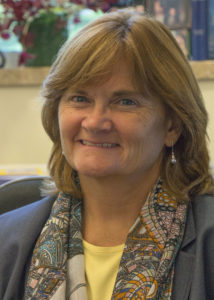 Earlier this year, Colleen McCabe was visiting the Wisconsin state capitol to meet with legislators about funding for her local school district, or as she describes it, “happily minding my own business.”
Earlier this year, Colleen McCabe was visiting the Wisconsin state capitol to meet with legislators about funding for her local school district, or as she describes it, “happily minding my own business.”
That’s when she got a text from a close friend, Morna Foy, who also happens to be the president of the Wisconsin Technical College System (WTCS). Foy asked McCabe to consider joining her at WTCS as Provost and Vice President of Student Affairs.
McCabe knew this would require her to fill the very big shoes of Kathy Cullen, who was retiring after having served in that role for more than a decade. Ultimately, she accepted and was named to the position in early August.
As she settles into her new role, McCabe said she is looking forward to learning more about the shape and history of the technical college system, and using her well-honed skills of innovation and collaboration to look across the system to make sure WTCS is best serving their learners.
Starting from her time as a college athlete and later a coach, McCabe said she believes in understanding the individual gifts of each player or student, rather than trying to force them into a prescribed system. Her greatest coaching challenge came when she served as the coach for a high school boys’ basketball team.
“Working with 19 ninth grade boys, you learn a lot about how to get your message across and get people working together toward a common goal,” she said.
McCabe began her career in education teaching high school health and physical education in Wisconsin. She went on to get her master’s degree in curriculum and instruction, from St. Mary’s, Winona, because she wanted to work to help integrate health skills and competencies across discipline areas in education. After 14 years of K-12 instruction, she joined the University of Wisconsin-Platteville as an assistant volleyball coach and lecturer. During her 17 years at the Platteville campus, she completed her doctorate in educational leadership, from Edgewood College and then entered into a faculty role, where she continued to teach and served as department chair of Health and Human Performance for 14 years.
McCabe also consulted with the state’s Department of Public Instruction on their health education initiative to help K-12 educators revamp their curricula to focus on the development of the health-related skills, through use of content activities and assessments. This “Skills are the Units” concept prompts developmental learning so that students know how to use health content effectively throughout life. Because of her work in both K-12 and teacher education training, the Wisconsin Health and Physical Education Association, honored her as the 2014 Health Educator of the Year.
Now at WTCS, she plans to leverage all of this experience to keep the technical college system on the cutting edge. She noted to support the vision, planning, and work needed to remain a leader in career and technical education requires the ability to adapt and make changes.
“Change is hard,” McCabe said. “No one welcomes it, even the minute changes. I believe my role at WTCS is about supporting people when they have to get out of their comfort zone when change is needed.”
Andrea Zimmermann, Senior Associate, Member Engagement and Leadership Development






 State Name: Missouri
State Name: Missouri

